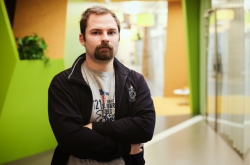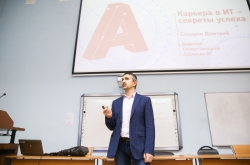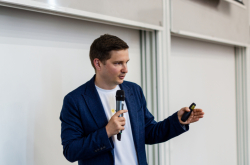Who are IT analysts and what do they do?
Maria Zvetkova, analyst for the Peter-Service company
In essence, an IT analyst is like a translator who interprets from “language of customers” to that of programmers. I constantly communicate with customers and programmers, analyse what the former need and explain it in terms the latter would understand. I work on projects that have to do with automation of our in-house processes which improve users’ interaction with software. Also, I work on integration of software, like when we have to introduce a new one into the already existing business processes. My main task is to organize the communication in such a way that everyone - the customer and the programmers - would understand what they need to do. Also, it is important to relay feedback to the programmers.
 Credit: habrahabr.ru
Credit: habrahabr.ru
Today, being an analyst at an IT-company is about more than just having an understanding of business processes - it is important to be aware of the capabilities of an IT department, and to know how one can use databases and various software for particular tasks. Sure, you can pick just any accountant and ask them to communicate with a programmer. Yet, that would be ineffective, as accountants have their specific tasks, they don’t know much about programming, and the programmers often lack skills necessary to understand what this accountant wants.
Ekaterina Ryiseva, analyst for the Peter-Service company
My main responsibility is to analyse the customers’ requirements. I have to formalize them and translate them for the programmers using knowledge of the field the product is meant for. My department deals with projects related to the Internet of Things (IoT). For instance, we are currently developing software that helps manage objects and processes based on machine-to-machine interaction and IoT. This technology’s main purpose is to manage connections of devices with embedded SIM cards, as well as cost management of communication services.
 Credit: nextbigwhat.com
Credit: nextbigwhat.com
For instance, a SIM-card can be inserted in a special device in a car and used to track data on its routes, fuel consumption, traffic violations and such. A similar technology is already used in the Platon electronic toll collection system for trucks. Also, M2M can simplify ATM maintenance by allowing servicepeople to get all kinds of information remotely. The technology’s application for vending machines also looks most promising.
Ed: the M2M technology fits greatly into the digital economics (robonomics) concept, where machines and devices will be able to communicate with each other, exchange information and order spare parts and repairs automatically. You can read more about robonomics here.
On becoming an IT analyst
Maria: My path to becoming an analyst was quite long. I entered ITMO University in 2007 by joining the Department of Professional Education Technologies (currently the Department of Intelligent Technologies in Humanities). I started working there as an assistant during my second year, then became an engineer. At the same time, I started working as a hotline operator at a telecommunications company. After some two years, I quit both this job and my work at the department, and joined a company that developed accounting software.
 Maria Zvetkova
Maria Zvetkova
I went to companies, installed it and explained how to use it. Then I left for the telecommunications company I’d previously worked for, but as a specialist in in-house business processes this time. I established communications between different departments so as to optimize software development processes, marketing and sales. Then, I worked for two more companies, where I performed systems and business analysis. At one of them, I had the invaluable experience of working as a project lead: I got to manage a team that included developers, testers, analysts, data specialists. This helped me develop communicative and creative skills, which are essential for my current job at Peter-Service.
Ekaterina: I studied at ITMO University at the Department of Computational Photonics and Videomatics. I wanted to do research, and even joined a PhD program. I had a great research advisor, who inspired me greatly. Yet, after a year in my PhD program, I understood that science is not my thing - such things just happen sometimes. I realized that I wanted to do something different. I became interested in software development, even though my field of focus was quite narrow - photonics, physics. Yet, we also got training in disciplines that had to do with IT. So, I began working as a tester, then developed software documentation. I got into Peter-Service by simply replying to a job offer on a recruitment website and passing several interviews. My first job here was as a technical writer, as well. To do that, I had to learn to read code, describe development processes and test programs. This is quite a lot of analytical tasks, and thus, I gradually became a systems analyst.
 Ekaterina Ryiseva
Ekaterina Ryiseva
How did you decide to start working in IT?
Maria: Since my first year at the university, I knew that my future job would have to do with programming. At that time, we knew little about analytics, and didn’t know that one can work as a pure analyst: we believed that you can be either a programmer or something else, something incomprehensible. Yet, even back then I had project work where I had to design software, not just code. And I was better at it than at coding.
Ekaterina: I can’t really say when exactly I decided to work in IT. Most of my peers started working in IT as testers and programmers, and after they’ve shared their experiences, I got interested.
 3rd International Telco CTO Summer Summit 2017 organized by Peter-Service company
3rd International Telco CTO Summer Summit 2017 organized by Peter-Service company
On the peculiarities of working for a big IT company
Maria: Once you’ve started working for any company, it takes several months to learn its processes and understand what you are to do there. Also, you need time to learn the in-house programs used for systems analysis. You also have to use new methods for every other project, keep up with the new technologies. This is why it’s great when the company educates its staff.
 Peter-Service's corporate conference 2017
Peter-Service's corporate conference 2017
As for Peter-Service, the biggest difference from other companies I’ve worked for is their attitude towards employees. Here, they want people to get better results, fulfill themselves; rather than sucking them dry until they leave, they help us develop. It is very important to find a company with such an attitude, where your colleagues are like-minded people. I am really happy that I’ve found one. Also, I know that, at our company, we have the opportunity to participate in different projects, and, by working on different projects at the same time, employees can develop themselves in the fields they find interesting. As for me, I’ve been working here for just four months, so I don’t really need such a change of pace. Also, I really like the company’s social policy - for instance, one can take a half-year vacation without losing their job.
Ekaterina: At my previous job, I once understood that I’ve reached my development peak and there’s nowhere to grow anymore. This is why I’ve started searching for a new job. I really wanted to test my skills, learn whether I can work in different fields, on different projects. My work as an analyst lets me develop my communication skills. If I have any questions, I can always turn to my colleagues for help. They are great professionals, so I can learn a lot from them.

Peter-Service's corporate conference 2017
What did studying at the university give you and why it is important to start working as early as possible?
Maria: Everything I’ve been taught at the university I can use in my work. During your Bachelor years, they give you lots of practical knowledge in what has to do with software development, and Master’s programs are more about developing your communication and data analysis skills - the more advanced knowledge, so to say. Both of my diplomas had to do with information systems design, generally the same thing I now work with. Yet, I believe that it is practical activities that form one’s personality. Thus, when you start working during your university years, you start developing your personality. At the university, you feel like you’re a part of a family. And at work, you need to learn how to establish communications with people who owe you nothing, who may well want nothing from you or don’t even want to communicate with you.

From my experience, students who come for an internship at our company don’t even know what work is all about. They are afraid of interacting with their colleagues, they have stereotypes about the dress code and many other formalities that are totally outdated. So, education gives one great groundwork, but it must be developed through months or even years of practice. In essence, the more experience you have, the better. For instance, when I was a Master’s student, I even worked as a lecturer at my department. That was really cool, as I learned a lot from the students, and also got a boost of positive emotions!
Ekaterina: For me, the university was more of an institution that helped me decide on my development path than some place where I got knowledge. At the university, you understand what you’re interested in; as for professional competencies, you get those from practice, so you should do your best to find work that will let you fulfill yourself. I believe that I’ve found mine.





